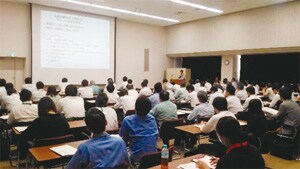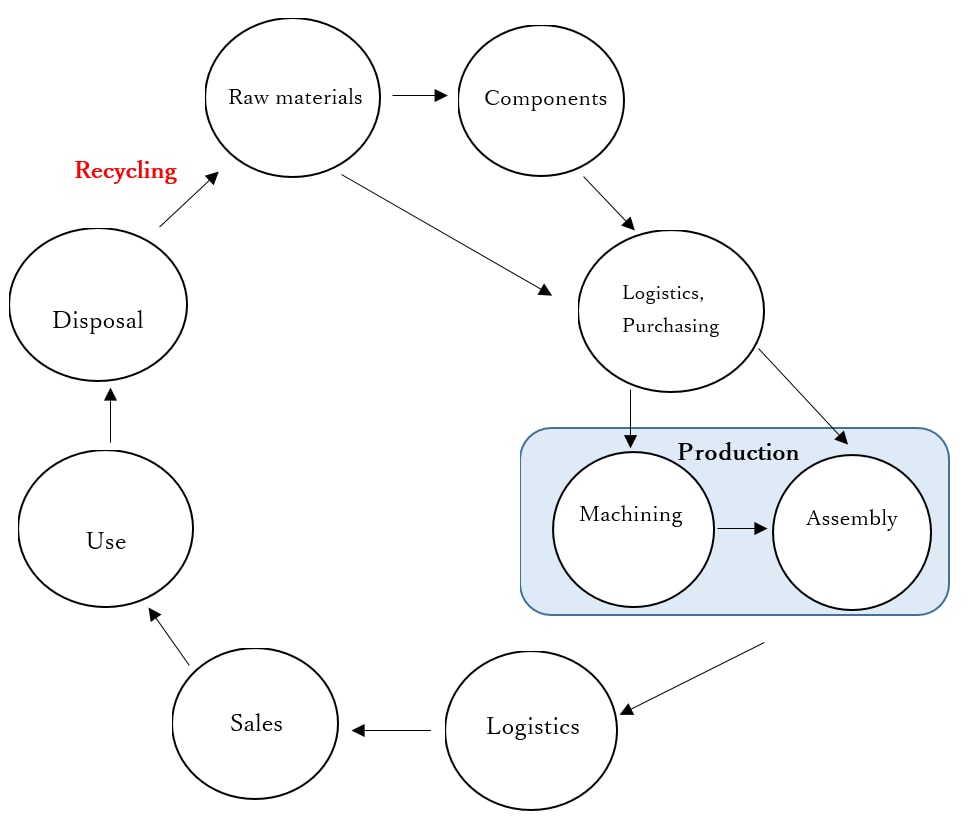Basic Policy
We shall conduct transactions based on symbiosis and EQCD (environment, quality, cost, and delivery).
General Rule

(1) Conducting Transactions Fairly
We shall observe all applicable laws and regulation and conduct transactions with fairness and transparency.

(2) Establishing Partnerships with Suppliers
We shall select and establish partnerships with suppliers that are able to supply products with appropriate quality, price, and delivery lead time.

(3) Promoting Procurement Based on CSR
We shall procure products from suppliers that respect social responsibility (such as respecting human rights and reducing environmental impact).
Measures for Conflict Minerals
Efforts
Measures for CSR Procurement
To ensure compliance with restrictions on the chemical substances contained in products and other various international laws and regulations, we are actively engaged in green procurement practices that prioritize procuring raw materials with a minimal environmental impact. In addition to the three main measures of obtaining non-inclusion guarantees from suppliers, auditing suppliers for RoHS compliance, and analyzing chemical components in sampled procured items, we also conduct annual informational presentations to promote a deeper understanding of conflict minerals, slavery laws in various countries, SDGs, and other issues. We also monitor green procurement rates each month, even for office supplies, and have been participating in the supply chain subcommittee of the Global Compact Network Japan since September 2019. Furthermore, for member companies of the Shimadzu Cooperative Association, we also conduct environmental seminars and promote supplier environmental activities, such as jointly collecting waste plastic or diagnosing energy savings.
| Domestic Suppliers Monitored |
746 of 794 (94 % implementation rate)
|
|---|---|
| Percentage of Non-Inclusion Guarantees Obtained |
100 % (for 95,600 items)
|
Eliminating Human Rights Violations from the Entire Supply Chain
Requirements for suppliers in the procurement policy are summarized in the CSR Procurement Policy, which clearly specifies fulfilling social responsibility for respecting human rights throughout the entire supply chain. In addition, all suppliers are notified in writing and required to comply with the policy.
We also survey suppliers within and outside Japan to confirm they have measures for respecting human rights and to check for any human rights violations in their business practices. If that survey reveals any problems with child labor or forced labor, for example, then the supplier is asked to quickly implement corrective measures. We also continue to survey suppliers on an ongoing basis to ensure they are not complicit in any human rights violations in their business practices or supply chains, such as child labor, forced labor, or human trafficking.
Measures and Policies for Conflict Minerals
In accordance with the Shimadzu Group Policy Regarding Conflict Minerals specified for conflict minerals*, if any part or raw material used in Shimadzu products is discovered to contain a conflict mineral, Shimadzu will immediately meet with the supplier to discuss appropriate actions, such as immediately discontinuing the use of such part or raw material. That does not mean Shimadzu will never accept any conflict mineral produced in the Democratic Republic of Congo or its adjoining countries, but rather that Shimadzu will only accept those that are procured in accordance with appropriate laws that prevent funding armed groups in those regions (certified as DRC conflict-free).
By managing transactions in accordance with the Organisation for Economic Co-operation and Development (OECD) Due Diligence Guidance for Responsible Supply Chains of Minerals from Conflict-Affected and High-Risk Areas and by investigating refineries using the Conflict Minerals Reporting Template (CMRT), which is based on the Responsible Minerals Initiative (RMI), we are implementing measures to understand the status throughout the entire supply chain and avoid using such materials.
- * The term conflict mineral refers to four types of minerals (gold, tin, tantalum, and tungsten) mined in the Democratic Republic of the Congo and nine surrounding countries, which are known to serve as a funding source for armed groups.
Analyzing Procured Parts, Materials, and Other Items for Substances Banned by RoHS
Randomly sampled RoHS-compliant parts, assemblies, and secondary materials procured from suppliers are analyzed in Shimadzu’s RoHS laboratory to confirm the content of substances banned by the RoHS directive. In February 2019, those measures were strengthened by also installing a gas chromatograph mass spectrometer (GC-MS) system in the laboratory. The RoHS laboratory also accepts non-Shimadzu visitors to share Shimadzu’s analytical expertise using the GC-MS system.
| Samples Analyzed |
10,000 for six RoHS-banned substances and 3,000 for four additional banned substances
|
|---|
Compliance with the Modern Slavery Act 2015
Shimadzu opposes slave labor and human trafficking, recognizes internationally declared human rights, and conducts business practices accordingly. Each year, Shimadzu publishes a statement regarding the measures for compliance with the Modern Slavery Act 2015 implemented during that year and planned for the future.
Measures for FY 2018 were published in August 2019. Similarly, measures for FY 2019 and subsequent years are scheduled to be published every year. Currently, no cases of child labor or forced labor problems have been discovered in our procurement activities. If any are discovered, corrections will be promptly implemented to quickly resume business activities that are respectful of human rights.
Informational Presentations for Suppliers
It is essential that we form a partnership with suppliers, who are central to our supply chain, to ensure human rights are respected in procurement activities and promote reducing our environmental impact. To promote a deeper understanding of our measures, each year we conduct informational presentations for suppliers in two locations, Kyoto and Tokyo, which are attended by over 500 suppliers each year.
In December 2018, as a project of the Shimadzu Cooperative Association, we conducted an SDGs workshop with a guest speaker from a leading company that is actively engaged in SDGs activities and was selected as one of the top 100 companies practicing new and diversity management methods. In addition, at the general meeting of the Shimadzu Cooperative Association in May 2019, we had a seminary where the Labour Standards Inspection Office explained key points about working practice reform laws.
In addition, as part of its CSR procurement promotion, Shimadzu conducts questionnaires to suppliers. This questionnaire includes themes such as environmental conservation and human rights. The results of the questionnaire are analyzed and evaluated, and used to select suppliers and implement improvement activities.

Informational Presentations for Suppliers
[About the previous questionnaire to suppliers]
- Target: 1,236 suppliers (Domestic and overseas)
- Initiatives: Send the documents related to "Request to promote CSR procurement" and conduct a "CSR Questionnaire" survey.
- Results: Responses received from 933 suppliers
- Our initiatives after the questionnaire
Based on the results of the questionnaire, we have enhanced the content of the explanation on the Modern Slavery Act at the Green Procurement Explanatory Meeting, operated the CSR questionnaire when opening a new account, added CSR evaluation items to the evaluation of continuing suppliers, and added human rights clauses to the basic contract for transactions with suppliers.
Overview of supply chain



